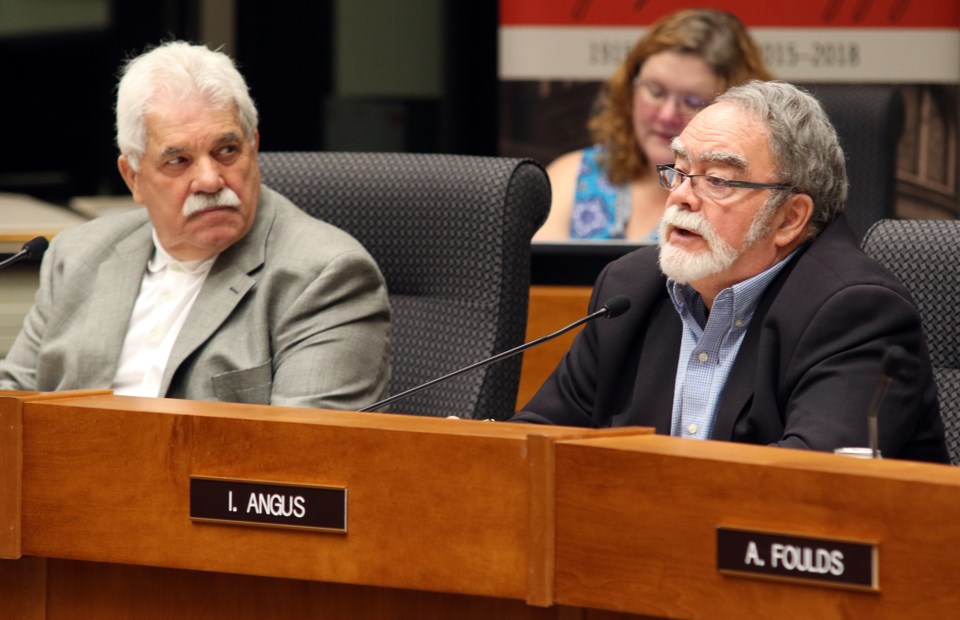THUNDER BAY -- City council has narrowly voted to support a rural tip in the balance of power around the District of Thunder Bay Social Services Administration Board table.
Council passed a motion to increase the Area One community representation on the DSSAB from one seat to three in a 6-5 decision on Monday night.
Thunder Bay currently holds half the DSSAB's 12 seats and pays 72 per cent of the share that district municipalities contribute to DSSAB-provided social housing and service programs.
Under the proposed changes the DSSAB and nine of its 17 member municipalities have already voted to accept, the board would increase to 14 members. The additional seats would represent Conmee, Gillies, O'Connor, Oliver-Paipoonge, Neebing, and Shuniah, collectively known as "Area One."
Area One members contribute 9.6 per cent of funds to the district's municipal share but on a two-year rotating cycle, any Area One municipality is only represented at the table once every 12 years.
Their representatives proposed establishing their own board in 2013, claiming to be paying millions of dollars more into DSSAB than their citizens could access annually in services. Five years of discussion passed and even a mediator was unable to broker an agreement.
It was Westfort Coun. Joe Virdiramo who finally forwarded the offer of two new spots, meeting Area One more than halfway on its demand for three additional seats.
"We're in a position where two would be a compromise in relation to representation and I know it does have a bearing on the whole reason of representation the region has," Virdiramo said. "I think this is a good move forward."
If Minister of Community and Social Services Helena Jaczek accepts the proposal, Area One would have half as many seats on the DSSAB as Thunder Bay does.
It wouldn't be the first time a minister has intervened in the Thunder Bay DSSAB. Representation was contentious when the DSSABs were created in 1990 and the ministry appointed a thirteenth board member to break any potential tie between the city and the rest of the district.
According to Coun. Iain Angus, the tie-breaking vote was never needed and the provincial appointee seat remains vacant.
Angus seconded Virdiramo's resolution on the strength of that long-standing peace, assuring council he has never seen a "gang-up where district folks conspired to undermine services" in the city. He said Thunder Bay shouldn't fear diluting its influence and he wants the district to present a united front before Jaczek.
"I do not want to see the city of Thunder Bay casting a negative vote because that will send a signal to the minister who will make the final decision that this region is truly split. I don't think we are," Angus said.
"We've worked hard to repair the damage that was done by a council many years ago to the point where we have an excellent relationship and I think it's important we send a signal that we're prepared to continue that process."
Current River Coun. Andrew Foulds agreed with Angus that the difference of opinion around the DSSAB table has less to do with geography than it does with philosophy.
"It is absolutely not about the city of Thunder Bay versus anybody else," Foulds said.
"When we go to DSSAB, we make decisions that are in the best interests of our most vulnerable citizens. I take that responsibility very, very seriously and I know other councilors do as well."
Nearly as many councilors opposed the change as supported it. McIntyre Coun. Trevor Giertuga pointed out the unincorporated areas known as Area 7 contribute 11.2 per cent to the municipal pot but also only have one representative.
He publicly pondered how long it would take those communities to demand a greater voice, lending credence to the concern over eroding Thunder Bay's influence.
"We talk about how we haven’t seen block voting – and that may be the case --but the potential is there," Giertuga said.
"We want good relations with our outside municipalities but this was made this way for a reason. Now there’s potential we could have services brought out to other areas… We’re paying 72% -- the lion's share -- of this. It’s incredulous to think we would put ourselves in potential jeopardy like that."
Northwood Coun. Shelby Ch'ng called the proposal "buying their votes," stepping over the financial question to the democratic theory of representation by population.
"This will give them (Area One communities) 21 per cent of the representation with only 8.6 per cent of the people," Ch'ng said.
"I'm sorry but democracy is about people. It's not about dollars."
Mayor Keith Hobbs and McKellar Coun. Paul Pugh were absent from Monday's meeting. The issue will return to city council for ratification on Feb. 13.
